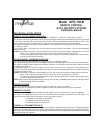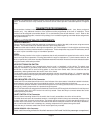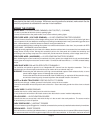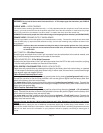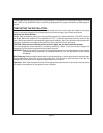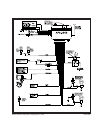
In these applications, the AS 9159 Door Lock Interface ( or equivalent 30A automotive relays ) must be
used. Refer to the AUDIOVOX Door Lock Wiring Supplement for proper connection to these types of
circuits.
COMPLETING THE INSTALLATION:
Antenna Wire: Be sure to extend the thin black antenna wire to it’s full length and cable tie into place
where it cannot be damaged. Avoid wrapping this wire around major, high current wire looms.
Adjusting the Shock Sensor:
Using a small screwdriver, gently turn the adjustment screw fully counterclockwise. ( DO NOT over turn
this screw. Maximum rotation for this adjustment is 270° ). Close the hood and trunk lids, and arm the
alarm. Wait 6 seconds for the accessories trigger zone to stabilize, then firmly strike the rear bumper with
the side of a closed fist considering the amount of force required to break a window.
CAUTION: Never perform this test on the vehicle’s glass, as you may break the window.
Turn the adjustment screw clockwise ( increasing sensitivity ) about ¼ turn and re-test. Repeat this
procedure until the alarm sounds when the bumper is struck.
WARNING ! Setting the sensitivity too high can cause false alarms due to noise vibrations from passing
trucks and heavy equipment. To decrease sensitivity, turn the adjustment screw counter
clockwise.
Wire Dressing: Always wrap the alarm wires in convoluted tubing, or with a spiral wrap of electrical tape.
Secure these looms along the routing using cable ties. This will ensure that the alarm wires are not
damaged by falling onto hot or sharp moving surfaces in the vehicle.
Operation: Take a few moments to check off the appropriate option boxes in the owner’s manual and to
fully explain the operation of the system to your customer.
Page 5



